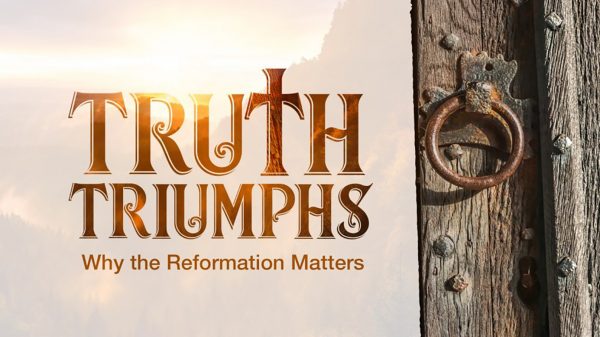This morning we begin the first of 10 messages in our doctrinal series this semester. Most of you (not all) will spend approximately 1,000 days arranged in eight semesters pursuing the education God has granted you in preparation for the vocation to which God has called you. A significant part of that educational journey is spent right here in this room listening to God’s Word and learning how to bring what it says to bear on every aspect of life.
Because your educational pursuit is an important and weighty matter, and because chapel is a significant component of that pursuit, we take chapel seriously and design it intentionally to speak to the big issues of life and faith that we all face as believers. Part of that intentionality is the design and intention of the messages preached on a doctrinal theme every Wednesday.
No doctrinal theme could be more theologically significant, personally applicable, and culturally relevant than the one Dr. Pettit has asked us to address this semester—the person, work and ministry of the Holy Spirit.
For believers, the most foundational doctrinal truth of the Christian faith is our belief in the Trinity. The Bible advances two important, essential truths about God:
1. The God of the Bible is one, articulated in the Shema of Israel (Deut. 6:4-5)
Israel was one of 70 nations and most of those nations worshiped a multiplicity of gods (polytheism). In contrast to the many gods of the nations, Israel was called to embrace the truth about God, and that truth was foundational to their identity as a nation because it actually was the truth: “Hear O Israel, The Lord our God is one! (Therefore) You shall love the Lord your God with all your heart and with all your soul and with all your might!”
So the Bible reveals an important reality about God: He is one! This theological belief came to be known as monotheism. All true Israelites in the Old Testament and all true Christians in the New Testament are monotheists.
However, as the revelation from God about Himself progressively unfolded in the 66 inspired books of the Bible, a second astonishing reality became clear about the God of the Bible.
2. The One God of the Bible Eternally Exists as Three Persons (Matt. 28:19)
The one God of the Bible eternally exists as three Persons who equally share the same nature, possess the same will, and have equal authority, power and glory. They are not three separate Gods who have agreed to work together in unity for a common purpose or eternal objective. Nor are they three persons who each possess 1/3 of the divine nature.
God’s whole and undivided essence (His nature, will, power, authority and glory) belongs equally, eternally, simultaneously and fully to each of the three distinct members of the Godhead. Another way of saying this is in essence (nature), each member of the Godhead is identical; in person, each is distinct. They are unified and identical in nature, distinct in person, with differing roles in accomplishing the divine plan with regard to creation, redemption and consummation.
All orthodox Christians confess and affirm this foundational belief of the Christian faith, and they know and affirm the deity of the Father and of the Son and of the Holy Spirit. However, most Christians do not really know or understand who the Holy Spirit truly is and what He really does in His mission and ministry as the third member of the God-head.
Not only are Christians woefully ignorant of the true nature and ministry of the Holy Spirit, many have inadvertently embraced wrong beliefs about the Holy Spirit that diminish His identity and distort His ministry. Let me give you three examples of what I mean:
- Many have adopted beliefs that reduce Him to a force or a power that we can “tap” into or “unleash” that will radically change our life.
- Many think of the Holy Spirit as some sort of magical spiritual “pixie dust” that we can activate or apply to our lives to make things work better.
- Even worse, many Christians consider the Holy Spirit as the lesser member or “junior partner” in the Trinity.
So, if God has revealed Himself as a Trinity and the Holy Spirit is an essential, equal member of the Trinity, who is the Holy Spirit and what is His ministry in our lives? And perhaps most importantly, what practical significance should this teaching have in our lives? Why does it matter?
Who is the Holy Spirit?
His Identity Disclosed by His Divine Names
Holy Spirit (Acts 1:8; Rom 1:4)
“But ye shall receive power, after that the Holy Ghost is come upon you:” (Acts 1:8)
“And declared to be the Son of God with power, according to the spirit of holiness, by the resurrection from the dead:” (Romans 1:4)
Holy — His divine character is identical to the holiness of God.
Spirit – This word literally means “divine wind or breath.” It speaks of an unstoppable, uncontrollable, and unpredictable force, energy, or strength applied by this person in holy ways for holy ends or purposes.
Spirit of God (Gen. 1:2) and Spirit of Christ (Rom. 8:9; Phil. 1:19)
“But ye are not in the flesh, but in the Spirit, if so be that the Spirit of God dwell in you. Now if any man have not the Spirit of Christ, he is none of his.” (Romans 8:9)
These names are not speaking primarily of ownership, as in the Spirit who belongs to God and Christ. They are also not speaking primarily of source, as in the Spirit who originated with God or with Christ. These names are speaking of the Spirit who shares fully the identity, divine nature, and divine prerogatives of Christ and God. The Spirit who is identical in nature, character, and authority as God. The Spirit who is identical to Christ. Just as Jesus is described as the express image or exact likeness of God, the Holy Spirit is the express image and exact likeness of God the Father and God the Son.
His Office or Role described by His Divine Works
Generally, the Holy Spirit energizes, empowers and actualizes the purposes and plans God the Father intends to accomplish through God the Son. Specifically, the Holy Spirit is uniquely involved in energizing or accomplishing God’s works of:
- Creation (Gen. 1:2)
- Revelation (2 Tim. 3:16; 2 Peter 1:20–21)
- Illumination (1 Cor 2:9–12)
- Incarnation and resurrection (Luke 1:35; 1 Peter 3:18)
- Redemption (John 3:5–8)
- Sanctification and preservation (2 Thess. 2:13)
- Consummation of all things (Rev. 22:17)
What is His Ministry to Believers?
Note that the Holy Spirit has ministry to Christ and to the World—but I am going to focus on His ministry to believers as found in John’s gospel.
There is an amazing statement Jesus makes in John 16:7, “Nevertheless I tell you the truth; it is to your advantage that I go away, for if I do not go away, the Comforter (Helper) will not come to you. But If I go, I will send him to you!”
If Jesus were standing here this morning and gave us the choice of having Him physically present with us on this campus every day, 24/7 OR having the Holy Spirit, most of us would say that is a no-brainer. We would obviously pick the opportunity to have Jesus physically present on our campus. BUT Jesus actually said there is a better choice: “it is to your advantage that I go away!” Why? Because when the Holy Spirit arrives, He can actually do something that Jesus could not do in His incarnated, glorified human body.
The Holy Spirit Comforts Us by Dwelling in Us
“If you love me, you will keep my commandments. And I will ask the Father, and he will give you another Helper, to be with you forever, even the Spirit of truth, whom the world cannot receive, because it neither sees him nor knows him. You know him, for he dwells with you and will be in you. “I will not leave you as orphans; I will come to you. Yet a little while and the world will see me no more, but you will see me. Because I live, you also will live.” — John 14:15–19 (ESV)
Jesus said that He was going to send someone who would be with every single believer forever. He promised that He would not leave us as orphans without provision, protection and His loving presence. So how would every believer experience the personal presence, loving fellowship, provision and protection of Jesus? How would He fulfill this promise? By sending a member of the Godhead who was in every way identical to Him in nature and essence. And the coming Comforter would not just be identical in nature to Jesus. He would also be identical to the Father!
The Holy Spirit Guides Us by Revealing God’s Truth to Us
“I have yet many things to say unto you, but ye cannot bear them now. Howbeit when he, the Spirit of truth, is come, he will guide you into all truth: for he shall not speak of himself; but whatsoever he shall hear, that shall he speak: and he will shew you things to come. He shall glorify me: for he shall receive of mine, and shall shew it unto you. All things that the Father hath are mine: therefore said I, that he shall take of mine, and shall shew it unto you.” — John 16:12–15
Not only would Jesus continue to be with them in the Holy Spirit, He would also continue to teach them, and the Holy Spirit would actually help develop and grow their understanding so they could comprehend all truth. What He would reveal to them would actually glorify Jesus and make Him even more precious to His followers. You and I actually know far more of the truth about Jesus this morning than His disciples did on the night Jesus gave them this promise. And there is more. The Holy Spirit has been assigned the wonderful job of revealing everything that the Father has revealed to the Son. You are being brought into the circle of knowledge regarding God’s eternal plan for the ages (Eph. 1:9–10)!
Why is this Significant for Us?
Like Jesus, the Holy Spirit took on a body that He indwells
At the incarnation Jesus took on a human body so that He could share fully in our human experience (yet without sin) so that He could be our merciful High Priest. At Pentecost, the Holy Spirit took on a body—the church—so that we could experience Christ’s personal presence, the Father’s amazing love and the fullness of God in us.
He grows, energizes and equips the body He has indwelled
Like the Holy Spirit energized Jesus during his earthly life so that He grew in favor with God and Man, the Holy Spirit also energizes His body so that we grow in favor with man and enjoy unhindered favor with God. He grows His body through the Word, He gifts His body with gifted spiritual shepherds and teachers, and He equips His body with spiritual gifts designed to mature them so they look like someone: Christ.
He glorifies Christ by maturing His body: the church
The Holy Spirit works in His body, bringing about maturity, for the purpose of three main goals:
- So they demonstrate the gracious attitude of God, or in other words the Fruits of the Spirit (Gal. 5)
- So they display the wonderful character of God (2 Peter 1)
- So they live out the gracious love of God (1 Cor 13)
Conclusion
In short, every aspect of your Christian life from regeneration to glorification is under the watchful care and powerful protection of the third member of the Trinity. What the Father designed and the Son purchased, the Spirit procures and preserves. The Holy Spirit is actually the member of the Trinity that is most active and present in your every day life. Any success you have in the Christian walk, any growth in grace is directly due to His influence in your life. So get to know Him this semester. Ask Him to reveal Himself to you in this series, and commit to grow not just in your understanding and appreciation of Him but in your love for Him.
This post was adapted from a chapel message preached by Dr. Sam Horn on Jan. 29, 2020. Watch the original message below:
Join us via Livestream for chapel at 11 a.m. on Mondays and Wednesdays.








